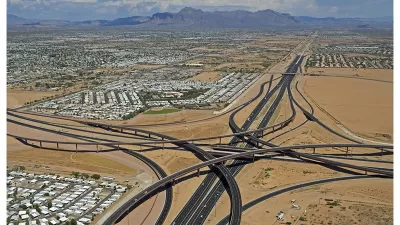The bill to reauthorize the current surface transportation law, "Moving Ahead for Progress in the 21st Century", a.k.a. MAP-21, was released on Monday and will be "marked up" on Thursday. Spending is kept at current levels of $50 billion a year.

MAP-21, signed by President Barak Obama on July 6, 2012, expires on September 30. Unlike that two-year bill that funded only two years (transportation reauthorization bills are customarily six years), this bi-partisan bill, the MAP-21 Reauthorization Act (S. 2322), will cover six years, going through 2020, an ambitious task considering the Highway Trust Fund shortfall, the difference between fuel tax receipts and Trust Fund expenditures, is estimated at $50 billion a year as of 2015.
"The bill doesn’t address the central issue of how to fund projects, a matter being left until later for congressional tax-writers. Differences over how to do that threatens Sen. Barbara Boxer's proposal," writes
he is receptive to the idea of tolling our existing Interstate highways," as we noted last month, and which Obama's "Grow America" proposal included, though most of the shortfall is based on revenues expected from questionable corporate tax reform.
MAP-21 made up the shortfall by relying on many revenue mechanisms unrelated to user fees. The result was a series of General Fund transfers to the Highway Account, the most recent being a "$9.7 billion transfer...processed shortly after the start of the fiscal year," according to the Highway Trust Fund Ticker.
"Boxer said last week that the upper chamber's bill would be enough to prevent a bankruptcy in the trust fund that is used to pay for federal road and transit projects that has been projected to occur at the end of this summer, even if it does not satisfy the Obama administration," Laing writes.
AASHTO's press release expressed gratitude to the Senators, particularly Boxer and Ranking Member of the committee, Senator David Vitter (R-La.) for "addressing the looming Highway Trust Fund crisis. Current projections show the Trust Fund could reach levels that slow and halt reimbursements to state DOTs within a matter of weeks," said Bud Wright, AASHTO executive director.
EPW released a press release, 2-page summary and text of the 150-page bill, also available on Thomas as S.2322. Sen. Vitter also posted a press release on the reauthorization bill.
Litvan adds that "House Transportation and Infrastructure Committee Chairman Bill Shuster, a Pennsylvania Republican, has yet to advance a companion proposal in that chamber."
FULL STORY: Senators Unveil Six-Year U.S Highway, Transport Cost Plan

Planetizen Federal Action Tracker
A weekly monitor of how Trump’s orders and actions are impacting planners and planning in America.

Maui's Vacation Rental Debate Turns Ugly
Verbal attacks, misinformation campaigns and fistfights plague a high-stakes debate to convert thousands of vacation rentals into long-term housing.

San Francisco Suspends Traffic Calming Amidst Record Deaths
Citing “a challenging fiscal landscape,” the city will cease the program on the heels of 42 traffic deaths, including 24 pedestrians.

Defunct Pittsburgh Power Plant to Become Residential Tower
A decommissioned steam heat plant will be redeveloped into almost 100 affordable housing units.

Trump Prompts Restructuring of Transportation Research Board in “Unprecedented Overreach”
The TRB has eliminated more than half of its committees including those focused on climate, equity, and cities.

Amtrak Rolls Out New Orleans to Alabama “Mardi Gras” Train
The new service will operate morning and evening departures between Mobile and New Orleans.
Urban Design for Planners 1: Software Tools
This six-course series explores essential urban design concepts using open source software and equips planners with the tools they need to participate fully in the urban design process.
Planning for Universal Design
Learn the tools for implementing Universal Design in planning regulations.
Heyer Gruel & Associates PA
JM Goldson LLC
Custer County Colorado
City of Camden Redevelopment Agency
City of Astoria
Transportation Research & Education Center (TREC) at Portland State University
Jefferson Parish Government
Camden Redevelopment Agency
City of Claremont


























